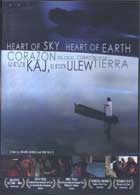
Heart of Sky Heart of Earth 2012
Distributed by Bullfrog Films, PO Box 149, Oley, PA 19547; 800-543-FROG (3764)
Produced by Eric Black and Frauke Sandig Umbrella Films in co-production with ZDF/3sat
Directed by Frauke Sandig and Eric Black
DVD, color, 98 min.
Jr. High - General Adult
Activism, Agriculture, Animals, Anthropology, Ecology, Environmentalism, Food, Folklore, History, Human Rights, Indigenous Peoples, Sociology
Date Entered: 02/02/2015
Reviewed by Caron Knauer, LaGuardia Community College, Long Island City, New YorkHeart of Sky Heart of Earth documents six Mayan people living in Guatemala and Chiapas, showing their connection to the land and history of their ancestors’ rich cultural traditions as well as their aspirations and fears of a future in which corporations, genetically modified corn, and tainted water threaten the health of the people and the planet. More visually satisfying than narratively so, the narrator-less film also provides vistas and views into contemporary Mayan lifestyles and activism. It’s short on background information about its six guides, and it doesn’t provide a through line but rather jumps around from character to character making continuity disjointed.
The camera’s on the move, panning over Palenque’s ruins, fields of corn, homes, marketplaces, and faces. Ancient and newborn turtles crawl on sand, framing the film and providing a motif. Culture evolves, but many of its inhabitants never leave. Corn is still intrinsic to the Mayans’ economy, but there’s an outcry about the damage genetically modified corn is doing. Also causing toxic damage is a multi-national corporation that’s set up shop, knocking down trees and leaking cyanide into the water, causing red spots on children’s faces. “The downfall of the Mayan period parallels what we’re going through now,” one man notes.
For us, one woman claims, “There are six senses and that includes the heart.” We see a small classroom at work. This woman is using her heart and education to encourage literacy activism. The majority of women in Chiapas are illiterate, and this young woman endeavors to “prepare their hearts to find a space where they might have a voice.”
Mayan creation stories are detailed, as is the horrifying history of the colonialism supported by a pope who encouraged conquistadors to take over lands because the indigenous people were “animals without souls.” Issues of Latino vs. indigenous identity are discussed in the film. Meals are prepared and served; worldviews and vows to protect the land and culture are shared. “Our ancestors invented a whole cosmovision,” a shaman in training informs us. A cosmovision that didn’t end on December 21, 2012, as the Mayans prophesized, and won’t end anytime soon.
Awards
- First Prize, Festival Internacional de Cine de Los Derechos Humanos, Bolivia
- First Prize, Best International Feature Film Planet in Focus, Toronto
- Audience Award, Nature Film Prize, Germany